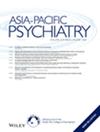A Comparative Analysis of Neurological Soft Signs and Emotional Intelligence in Rapid Cycling and Non-Rapid Cycling Bipolar Disorder
Abstract
Background
Rapid cycling (RC) is a special subtype of bipolar disorder (BD). Previous studies have rarely involved the investigation of neurological soft signs (NSS) and emotional intelligence (EI) in rapid cycling patients.
Object
This study aims to compare the differences in NSS and EI between patients with RC and non-rapid cycling (NRC) in BD.
Methods
The Cambridge Neurological Inventory and The Mayer–Salovey–Caruso Emotional Intelligence Test were used to assess the NSS and EI levels of euthymic patients with BD and healthy controls (HC). Patients were divided into RC and NRC groups.
Results
In terms of NSS, both the RC and NRC groups scored significantly higher than the HC group in the Motor coordination subdomain and total scores. In the Sensory integration subdomain, there was a significant trend of RC group scoring higher than the NRC group, which in turn scored higher than the HC group. In terms of EI, there was a trend of RC group scoring lower than the NRC group, which scored lower than the HC group in the understanding emotions subdomain and MSCEIT total score. In the managing emotions subdomain, the RC group scored lower than the HC group.
Conclusion
Compared to the NRC group, the RC group exhibited higher NSS levels, mainly manifesting in more severe sensory integration impairment. The RC group scored lower in EI, primarily reflected in understanding and managing emotions, and the managing emotions subdomain may serve as a more sensitive indicator to distinguish between the two groups.

 求助内容:
求助内容: 应助结果提醒方式:
应助结果提醒方式:


